- Home
- Jason Webster
Andalus Page 19
Andalus Read online
Page 19
‘We can’t have a mosque in the centre of the town. They all work in the fields anyway. They should build it on the industrial estate so they don’t bother anyone.’
I felt uneasy with this kind of talk. The Premiá story had been one of many over recent months that highlighted the growing importance of the immigration issue in Spain, and you felt an increasing tension as riots or racially motivated murders were reported in the news. The country’s birth rate was falling dramatically and was now the lowest in Europe. Within a couple of decades demographers were predicting the population would fall from forty million to thirty million. Immigration would have to be one of the solutions, yet Spain, as I’d learnt, had a fundamental and historical problem with the people closest at hand to fill the gap – the moros. Officially there were well over 200,000 Moroccans in the country – more than twice as many as the second-largest group, Ecuadoreans. The authorities were bending over backwards to keep them out, though, trying to open the door at the same time to more ‘acceptable’ immigrants such as Spanish-speaking Latin Americans or Christians from Eastern Europe. A similar policy had been adopted during the Reconquest, when German, French and other northern settlers had been invited over to farm lands newly conquered from the Moors. The legacy of those times was still as strong as ever.
I was puzzled that the prince’s friend should take such an aggressive attitude towards Muslim immigrants.
‘They wouldn’t bother anyone.’ The prince interrupted Guillermo with a smile. ‘The town hall gave them permission. Everything was all right until the Catalan authorities got involved.’
Guillermo sniffed and looked about to embark on a new anti-Islamic attack. I felt the meeting was going off the rails.
‘What about religion, though,’ I asked the prince quickly. ‘Are you Christian, Muslim … ?’
‘Neither and both,’ he said. ‘Islam and Christianity are essentially the same. I don’t like to use the word “God”. I think if anything of that nature exists it is too far beyond human experience to even give it a name. One cannot know God rationally. Perhaps only intuitively, and then only as cells in the body might know the thoughts of the brain. They can send messages – prayers, if you like – to the brain and the brain can choose to respond or not, by scratching an itch, for example. But that is all.’
There was a pause for a moment as I let this sink in. The tone of the conversation had changed rather suddenly after Guillermo’s outburst.
‘You’re a Pasha of Islam, but also recognized by the Pope.’
‘I’m recognized all over Europe. I have titles from all kinds of countries. Guillermo, do you know where the list is?’
Guillermo looked sulky. ‘They’re written down somewhere,’ he said finally. He seemed like a child, annoyed at not being the centre of attention.
But the prince returned to the subject of his family, and had me read aloud long passages from a self-published book supporting his claim to the illustrious Banu Qasi lineage.
‘Abd Allah ibn Muhammad ibn Llop was succeeded by…’
‘Yes, this bit, this bit,’ he said, wriggling in his chair enthusiastically.
‘What happened to your family during the Reconquest?’ I asked, trying to change the subject.
‘Some went into hiding in the Huesca region. We had castles stretching all the way from the Pyrenees to the sea.’
This great territory – almost a kingdom in itself, with castles and villages and houses – which the family had held on to through Iberian, Roman, Visigothic and Moorish times, had been lost as the Christians pushed south. Now there was just a little flat, decorated with nick-nacks from a North African bazaar.
I flicked forwards a few pages in the book and found a reference to the Order of Muza, of which the prince was Grand Master.
‘A noble and gentlemanly order, without any political bias, that works to bring about the union of religions and the brotherhood of the Arab peoples with the West.’ One of its ranks was the ‘Great Star of Islam’, which carried the title ‘Sidi’, as in El Cid.
We drank ice-cold Cava from silver goblets, with a toast to the house of the Banu Qasi, before finally it was time for me to leave. Exchanging cards, we shook hands. It was as though everything moved around him, but the prince was always still.
‘He’s got women crowding around him all the time but he’s never interested,’ Guillermo said with a cheeky smile. ‘I’ve got a new girlfriend …’
‘No heir, then?’ I asked the prince. He shook his head. It appeared to be a sore point.
‘Come and call when you’re next in Barcelona,’ he said as I walked down the stairs to the front door.
Guillermo and I walked out into the white evening light.
‘The town hall is going to pull his house down,’ he said. ‘They want to build more towers like those.’ We looked up at the glass and concrete office blocks stretching up from the next street. ‘Damn them.’
‘They’re throwing the prince out of his own house?’
‘He’ll be all right.’
And with that he was gone; the Vizier of the Order of Muza, hurrying round the corner to catch a bus home.
Not only a living remnant of the Moors, I thought. So much about the prince embodied Spain’s relationship with its Islamic past: partial understanding, hidden in a corner somewhere like an exotic but slightly embarrassing piece of furniture. And when it didn’t suit or it got in the way, a simple rejection or wiping clean. Just like the city of Barcelona was doing now with the prince himself, the last of the McAlmosts.
I met up with Zine at a bar on the edge of the Ramblas, the central avenue that ran like a spinal cord through the city from the Plaça de Catalunya down to the sea and the statue of Columbus pointing out, bizarrely, towards the east. Another little-known Moorish legacy, ‘Rambla’ came from ramla in Arabic, meaning sand, or a sandy stretch of river bed where a river flows into the sea. Alicante had a similar avenue – La Rambla – pointing down to the harbour, while in Alexandria I remembered catching trams to Ramleh, the main square by the Esplanade where we’d suicidally buy ‘death burgers’ for lunch from Abdessalem’s rancid little fast-food stall near the taxi rank.
As I sipped an orange juice, I looked at the people sitting around us at the bar, and took note of what they were eating and drinking, their clothes, what they were doing: one middle-aged man sat at the table next to us wearing cotton trousers and a silk shirt, sucking his lips and gums as though he had just cleaned his teeth; at another table a couple were eating meatballs in thick onion and tomato sauce with rice and a spinach salad; another man, black hair slicked back in the fashion of many right-wing Spaniards, read a front-page newspaper story about the latest rocket technology about to be used against the Iraqis. He seemed uninterested, though, and turned to the horoscopes, sipping on an iced soft drink in a tall glass. Just a few feet away two elderly men were leaning over their chess game, one of them absent-mindedly stirring the sugar into his coffee with a continuous tink-tink-tink as he tried to work out his next move. Three women on the other side were chatting incessantly, but for a second their conversation inexplicably dried up.
‘Must be an angel passing overhead,’ one said.
And I began to see. Perhaps because of my visit to the prince, or as a result of my journey, as I took in my surroundings connections began to form in my mind: the picture I had been trying to grasp for so long. Before it had seemed like something just outside my field of vision. But now I realized that so much of this scene, in modern Barcelona, came directly from the Moors. Yet the connection was almost invisible.
I wondered if the man wearing cotton trousers knew that cotton was first grown on a large scale by the Moors in Spain, from where it passed to Europe. The word ‘cotton’ – algodón in Spanish – came from the Arabic al-qutun. Silk-making knowledge was brought into the Arab world after 840 when the astrologer-poet Yahya al-Ghazal, or John the Gazelle, visited Byzantium. He smuggled the techniques back with him to Spain, from where si
lk-making began to travel north. Toothpaste arrived in Spain from Baghdad in the ninth century; meatballs, rice and spinach all came to Spain via the Moors; the paper the newspaper was printed on was a direct legacy of Europe’s first paper mill at Játiva; rocket technology was built on the higher mathematics translated into Latin from Arabic in Toledo; horoscopes, astrology, and with it astronomy, were brought to Europe through Moorish Spain – today astronomers still refer to many stars using their original Arab names, for example ‘Betelgeuse’.
Iced soft drinks were mentioned in the Thousand and One Nights, where they were served to the Caliph Harun al-Rashid – the Arabic word for iced drinks, sharba, was still remembered in the Spanish word sorbete and the English ‘sherbet’ and ‘sorbet’, as well as ‘syrup’. The first European to discover the formula to make glass was an Andalusi Spaniard in the ninth century called Ibn Firnas – Moorish Spain subsequently became a producer of glass and exported it to its Christian neighbours. Ziryab, the musician trendsetter from Baghdad, first brought chess to Spain in the ninth century. Around the same time, a host of Persian superstitions gained currency in Islamic Spain, subsequently making their way into Europe – among them were the ideas that angels passing overhead stopped conversations in mid-flow, that breaking mirrors was generally a bad thing, and that the number thirteen was unlucky. Moorish Spain had also introduced sugar to Europe – sugar was mentioned in Spain as early as 714, just three years after the Moorish invasion, and sugar cane became one of the staple crops on the Iberian peninsula. Oranges were virtually unknown in Europe before the Arab conquest.
I saw all this in a single, compacted second, like a dot of concentrated energy.
Ask anyone and they would say Spain was symbolized by bullfighting and flamenco, perhaps also the Civil War. ‘Moorish’ Spain was a detail of that picture, limited to the south of the country at most.
I understood in that moment, however, that it was the very canvas on which the country had been painted, sometimes obscured by the image represented, visible only at the fringes, but always there, just a layer or two underneath. And if you looked closely you could see it in the texture behind the paint, and very occasionally where the artist had left the canvas bare.
Ordering some snails in tomato sauce, I told Zine about my meeting with Prince Almuzara.
‘Sounds like you found Musa himself,’ he said when I’d finished.
CYBER MARY
‘¡Qué fuerte, tío! Bloody hell!’
The semi-naked muscle man bellowed his catchphrase for the hundredth time as a blonde topless Mother Christmas handed him the butt of the joint that had already circled the cramped room.
‘My nipples are itching,’ she said. ‘I think it’s this gold body paint.’
‘Here, I’ve got some soothing cream.’
A second topless dancer – a redhead – handed her a crumpled tube as she scratched at the stretched aureole around her pneumatic breasts, peering downwards with a frown that made the ligaments stand out in her neck. Her fingernails left ugly tracks in her skin.
‘I’ll have to make up again,’ she said. ‘You can see the scar.’
‘Should I give her a hand?’ Zine whispered to me, fake beard wobbling loosely on his chin when he spoke.
‘I heard that!’ The rest of the dressing room laughed as she turned her slender back on us to make herself up again.
I said nothing: they were just working, like the rest of us that night. Some taken on for their dancing, others just for the way they looked, like Zine himself.
‘Un moro as Joseph?’ Ramón had whined when I’d mentioned my Moroccan friend. One of the dancers had pulled out and he needed a last-minute replacement to play the putative father of God at the disco. ‘Ostias, tío. That’s perfect. Is he good looking?’ And he’d giggled over the phone like a schoolgirl.
‘He’s got a girlfriend, and she’s pregnant.’
‘Ah, bueno. I’ll just look, then.’
A friend had recommended drinking diet cola to ward off the worst symptoms of nausea, but two months after we’d got back to Valencia Lucía was still suffering as the first signs of the half-Moorish child growing inside her began to show. Despite spending most of the morning lying down in a pale dizzy haze, squeezing her rehearsals into the afternoons and performing occasionally at night, she was the happiest I had ever known her, her full face fixed into a wide grin.
‘¡Qué feliz me has hecho!’ she sang. ‘¡Ay qué bien! Me lo has devuelto.’
She’d been overjoyed when I brought Zine back with me; any sourness that had accompanied his previous departure had evaporated. Well rounded as she was, she seemed to have lost quite a bit of weight when I first saw her on our return.
‘She thought she was never going to see him again,’ Salud told me. ‘Zine had been on the point of staying behind with her when you left, but she told him to go. She was worried about him not finding work.’
I understood why he’d said so little about the separation now. In the end I had probably been holding him more to my promise than he had.
Their reconciliation was immediate: Zine asked to be dropped off directly at her flat when we finally arrived back in the city, and when he still hadn’t shown up at our place by the following morning I assumed the best.
‘I’ve told her everything,’ he confided in me when he called a couple of days later. ‘She says she wants me to stay this time, Jasie!’
He’d moved in with her, but they didn’t find out till a couple of weeks later that she was already over a month pregnant from when he’d previously been in Valencia. After just a week of honeymooning, he’d been spending most of the day out of the house trying to make contacts in the building trade or among other Moroccans who might be able to help him find a job.
‘Just get married,’ I said when he told me the news about the baby. ‘That would sort out the legal stuff, at least.’
‘I want to find work myself first,’ he said.
Marriage at this stage would mean he’d failed: a lift up to the top when what he wanted was to have climbed there himself. He had chosen to come back to Valencia to be with Lucía, but at the same time I could understand how he might want to feel settled as a result of his own efforts. I was concerned, though, that this was not the only reason for his reluctance to get married – I wasn’t convinced it was a path he was ready to go down yet. Impending fatherhood had been invigorating but had also beaten something out of him.
‘I want you to be my Arabic teacher,’ I said, trying to find ways to keep him going financially. ‘Formally. I’ve lost so much of it since university. You can teach me Moroccan dialect. I’ll pay.’
‘No, Jasie. I can find someone else for you, though.’
And so it had gone on.
‘I’m going to be the father of a half-Spanish child,’ he said one morning when we met at the bar on the corner of my street. He gripped the table, coffee swirling inside our cups, before falling back into his chair with a sigh. ‘But what kind of father am I going to be? Lucía’s family give her money, but I need to be as welcome here as my child will be. Not the sponging immigrant, not the crazy moro.’
His thoughts and feelings at that moment were not dissimilar to some of my own. There were different rules abroad. The question was whether it liberated you or imprisoned you even more. The line between the two wasn’t always clear.
Yet he seemed happy with Lucía. The two of them were out most nights going to gigs or just hanging out in the bars of the Carmen district, Zine sliding into her life like a missing piece of a jigsaw puzzle: she knew lots of people in the city from her performances and had a circle of friends who almost always went out together. If anything, I thought it too set up for him: the flat, the social life. The pregnancy had been the only mistake in it all, but now they both seemed pleased about it. Lucía was already turning down gigs for the following summer. ‘Voy a ser madre,’ she’d say, a calm serenity filling her young round face. Just a girl, but she was growing into the idea
of motherhood just as the baby grew inside her.
‘Can you see me filling out?’ And she’d place her hands on her chest. ‘Mira, por fin tengo tetas de verdad.’
The pressure Zine placed on himself to get work without any help – even from Lucía – was increasing. With the holidays starting, he had found nothing apart from the odd day of work, cash in hand. So when Ramón told me he needed someone last minute for the Christmas Eve disco job, I immediately put his name forward. Ramón accepted without any hesitation: in the upside-down world of the gente de la noche, where appearance was substance, the Moroccan would be exotic and exciting.
Zine, though, had little idea about what to expect. Valencian discos – great warehouses on the edge of the city – were surreal places. Salud had been working in them sporadically for years – it was a way of earning quick money when there was no work acting or dancing flamenco – and recently I’d been joining her: as a hired driver, or even, like tonight, as part of the performance. Neither of us, though, were of the ‘tribe’ – people looking for an image that involved dressing like clowns and taking large amounts of pastillas. I wasn’t sure what they put in the drugs these days, but there was an increasingly hard-edged quality to disco environments. Not the love-in of Ecstasy days: it felt angrier and sharper.
‘It’s a hundred and twenty euros for just a night’s work,’ I said.
‘Do I have to dance?’ Zine looked doubtful.
‘Not really. We just get dressed up and look decorative.’
‘I’m not sure.’
‘It’s fine,’ I said. ‘If anything, it’s boring. We sit around in the dressing room most of the night, then three or four times we go out and walk about.’
‘What?’
‘It’s Christmas Eve. They just want us as a sort of walking nativity scene. You know, the thing with the Baby Jesus …’

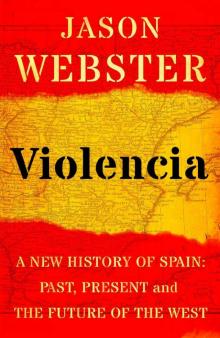 Violencia
Violencia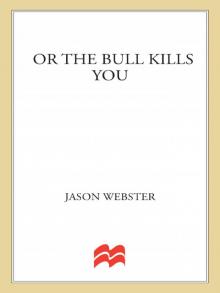 Or the Bull Kills You
Or the Bull Kills You The Killing of El Niño Jesús
The Killing of El Niño Jesús The Spy with 29 Names
The Spy with 29 Names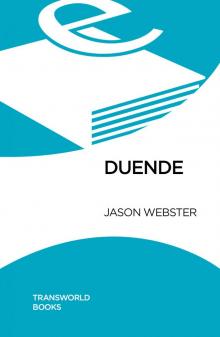 Duende
Duende Guerra
Guerra Sacred Sierra
Sacred Sierra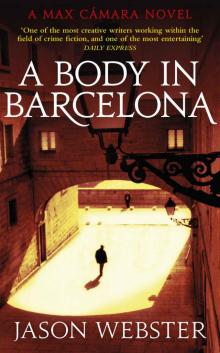 A Body in Barcelona: Max Cámara 5
A Body in Barcelona: Max Cámara 5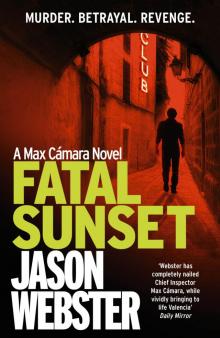 Fatal Sunset
Fatal Sunset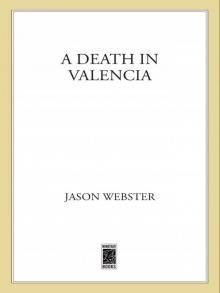 A Death in Valencia
A Death in Valencia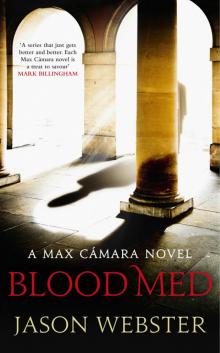 Blood Med
Blood Med Andalus
Andalus